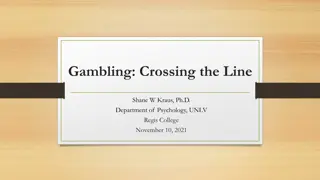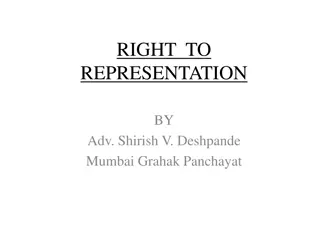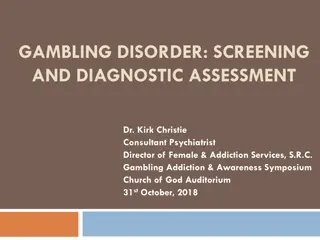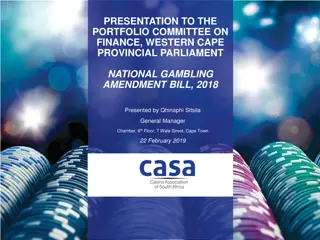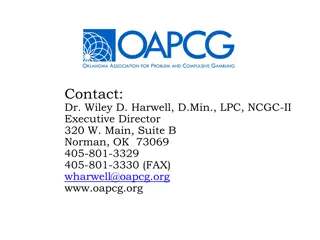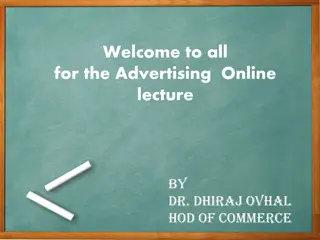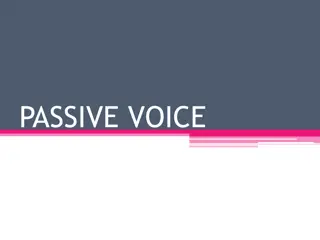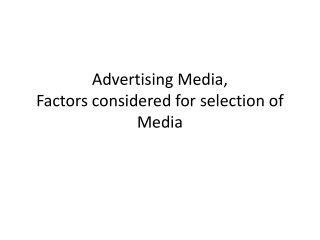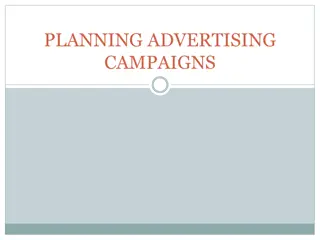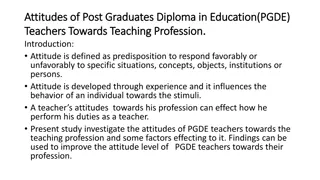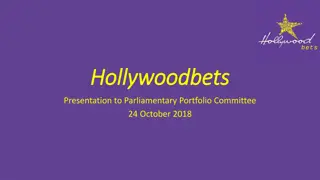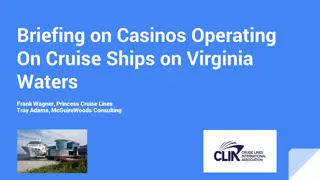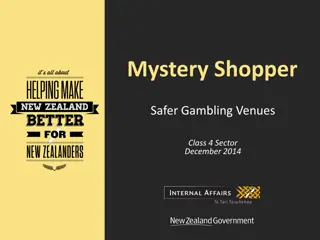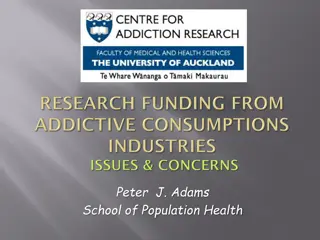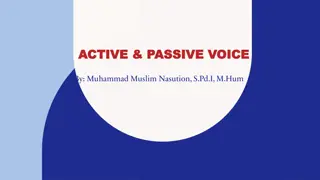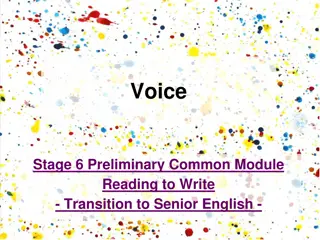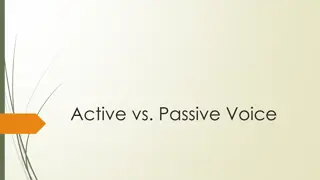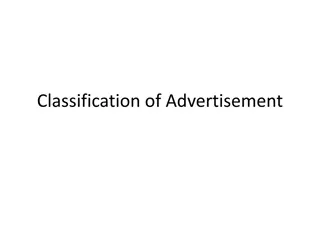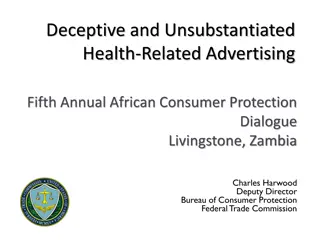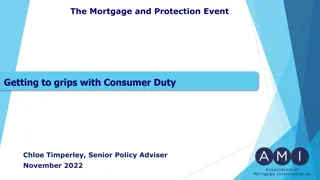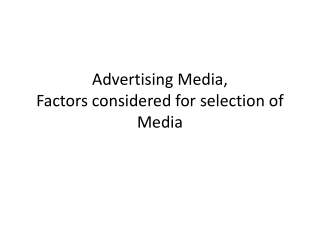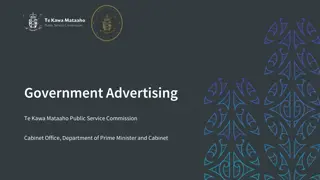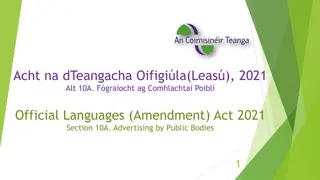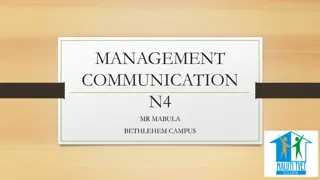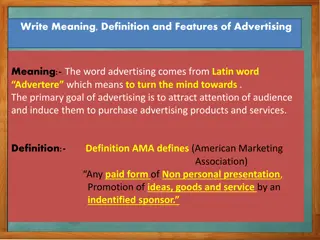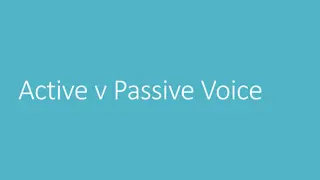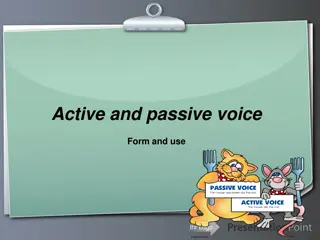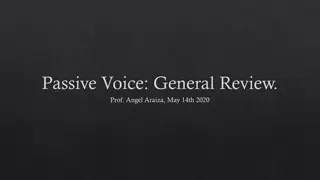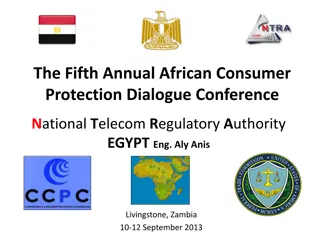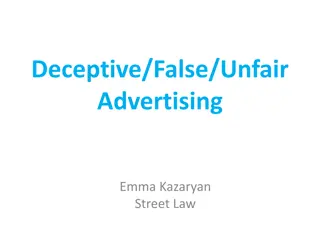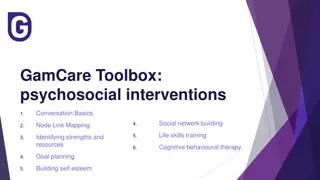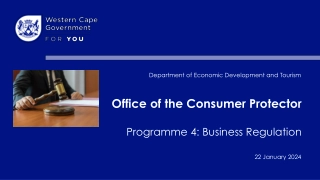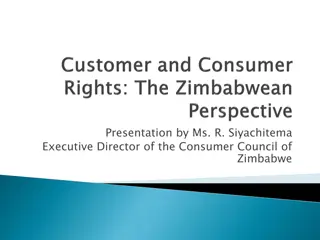Consumer Voice 2019: Attitudes Towards Gambling Advertising Research
The Consumer Voice 2019 report explores public attitudes towards gambling advertising, highlighting the need for tighter regulations to address concerns about the volume and targeting of advertisements. Participants expressed predominantly negative views on gambling advertising, particularly in sports and online platforms. The report suggests the necessity for increased promotion of safer gambling practices and better regulation to protect vulnerable populations.
Download Presentation

Please find below an Image/Link to download the presentation.
The content on the website is provided AS IS for your information and personal use only. It may not be sold, licensed, or shared on other websites without obtaining consent from the author. Download presentation by click this link. If you encounter any issues during the download, it is possible that the publisher has removed the file from their server.
E N D
Presentation Transcript
Consumer Voice 2019: Researching Attitudes Towards Gambling Advertising Prepared on behalf of the Gambling Commission March 2019 INSERT CLIENT LOGO
Consumer Voice | Executive Summary Key Objective: To gain a greater understanding of consumers views on gambling advertising exploring how gambling advertising influences opinions, motivations and gambling behaviours Methodology: The research for this piece of work consisted of a qualitative methodology (via the 2CV Momento platform) drawing on responses from 40 participants over a period of 10 days. Exec Summary Points for further consideration The timing and targeting of gambling advertising (across the wide range of channels it operates in) was felt to be in-need of tighter regulation to curb the potential for gambling advertising to reach at- risk gamblers Despite attitudes to gambling being mostly positive and permissive attitudes towards gambling advertising overall were predominantly negative. The primary issue cited for holding negative perceptions was the sheer volume of advertising. The advertising for serious and online gambling types were felt to require tighter advertising regulation due to their ease of access and a perceived lack of barriers to risky play. The prevalence of gambling advertising in sport was a complex issue most felt the volume was excessive, but some felt gambling had a positive impact on sport. While some feel that there is sufficient promotion of safer gambling, the effect of it is diluted due to the sheer volume of ads that people are experiencing. Respondents felt that gambling should be more forceful in promoting safe usage. Most felt more regulation was needed to limit the amount of gambling advertising young people are exposed to when engaging with sport. While there has been a shift in responsible industry advertising, with respondents feeling that they have seen more about safer gambling in recent years, there is still scope for improvement. 2
Contents 1 Background & Objectives 2 Gambling Advertising Perceptions 3 Gambling Advertising in Sport 4 Gambling Advertising on TV 5 Safer Gambling Advertising INSERT CLIENT LOGO
Background & Objectives INSERT CLIENT LOGO
Consumer Voice | Exploring public attitudes towards gambling advertising To gain a greater understanding of consumers views on gambling advertising exploring how gambling advertising influences opinions, motivations and gambling behaviours Impact of gambling advertising on attitudes and behaviour Exploring a range of policy questions for gambling advertising Impact on the young and the vulnerable Specific questions to explore within these objectives Some questions to explore How does advertising have a behavioural impact nudging play? Are people gambling more as a result of advertising exposure? How does the perceived impact of gambling advertising differ between channels? How much does advertising shift perceptions of provider vs behaviour itself? Do people perceive a tension between gambling advertising and the gamble responsibly message? Some questions to explore How do bettors and non-bettors perceive potential changes to legislation? Do they see potential negatives (e.g. reduced investment in sport) as well as the potential benefits to the general public? Exploring preferences for different types of changes e.g. whistle to whistle, watershed Should there be different rules for different types of gambling? (e.g. bingo and lotteries can currently be advertised on daytime tv) Some questions to explore Is gambling advertising having an impact on the attitudes and behaviour of young/vulnerable people? Is it dangerous? To what extent does exposure to advertising increasing the desire of young people to gamble? 5
Consumer Voice | Phase overview - one slide summary We used the following platform for this phase Digital methods utilised: 2CV Heartbeat 2CV Audit 2CV Chatterbox 2CV Lens Phase Overview 40 2hrs participation 5 10 days participants activities TASK 1 TASK 2 TASK 3 TASK 4 TASK 5 Gambling Advertising Diary Exploring Gambling Advertising Sport & Gambling Advertising Gambling Advertising on TV Getting to Know You Quick personal intro followed by introductory questions to capture baseline attitudes & behaviours for gambling itself and gambling advertising consumption A repeatable in-the- moment task to capture all gambling advertising seen across the FW period Views on gambling ads versus other controversial products e.g. alcohol, HFSS products. How does gambling compare? A series of questions exploring attitudes towards gambling sponsorship/advertising in sport A series of questions exploring attitudes towards gambling sponsorship/advertisin g on TV 6
Consumer Voice Q1 | Summary of sample We focussed on core activities that see greatest share of advertising spend Within this - we still picked up the long tail of people exposed to other play types 40 participants total* 10 Non-Players 50:50 Male/Female split Spread of Ages 18-70+ Aim for majority to have an interest in sport All to have not gambled for 18+ months Mix of positive/negative & neutral attitudes - none to be extreme rejecters of gambling or former at risk/ problem gamblers 10 TNL/other lottery + Bingo 10 Sports Betting 10 Online Slots 80:20 Male/Female split Football betting skew + aim for mix of other Spread but skew older Half to have bet in play in the last month Exclude at risk gamblers 60:40 Male/Female split Spread of Ages 18-70+ Exclude at risk gamblers 50:50 Male/Female split Spread but skew older Spread of play frequency Exclude at risk gamblers All participants Regional spread (across South East/SE, Midlands, North, Scotland, Wales) A mix of life stages across sample (pre, young & older family & empty nesters) ensuring good representation of <18 s parents in the sample to provide personal perspective on the impact of advertising on young people 2: 1 ratio C2DE: BC1 (skewing to lower SEG audience) Majority of participants to have seen gambling adverts on social media in the past *The qualitative nature of the research means that the sample size is relatively small compared to the Gambling Commission s official statistic products. For this reason, the views of respondents in this research may not represent that of the wider population and this should be borne in mind throughout. 7
Gambling Advertising Perceptions INSERT CLIENT LOGO
Top of mind perceptions of gambling advertising portrayed a clear image of a comms landscape which is all about excitement, humour, convenience and fun A number of key ingredients for a good gambling advert were mentioned: The ones I pay attention more to are the humorous ones the lad from the inbetweeners isn t particularly humorous but I remember it Ray Winstone adverts as well. They don t necessarily leave a positive impression but they leave a memorable one from theme tunes or catch-phrases. Male, 33, Occasional Player, Scotland Playful banter / humour Recognizable celebrities High Chance of Winning Topical / seasonal subjects Emotionally Effecting Big Prizes A good gambling advert for me would need to be showing the odds are in our favour and the chances of winning are to be high. Also the prize will have to be worth it. Happy faces and showing real life situations of people winning Female, 27, Non-Gambler, North England Catchy Music / Bright Colours Charitable Donation Emphasising social The predominant tone of gambling advertising was perceived to be fun, loud, colourful, exciting and humorous This was particularly felt to be true of sports betting advertising the home of banter and tongue in cheek humour Bingo adverts were similarly singled out for successfully using cheesy humour and emphasising the social interaction around the gamble to promote the behaviour Free came out as a strongly associated word with gambling advertising reflecting the wording of offers and promotions people saw offering free bets/free spins/free credit etc. Gambling advertisements are appealing as they use a lot of bright colours and upbeat music. This will put people in a good mood and encourage them to play. The adverts catch your attention as there is always a lot of stuff going on in them to are interesting to watch... Female, 19, Non- gambler, South East 9
Despite attitudes to gambling being mostly positive and permissive attitudes towards gambling advertising overall were predominantly negative The primary issue cited for holding negative perceptions was the sheer volume of advertising Negative response largely driven by irritation. Either from the creative itself Humour is most frequently used route to generating a positive reaction How do you feel about this advert? The amount of gambling adverts is so high and done so through many different avenues. I get texts, app notifications, emails and adverts on social media which I believe is too much - whenever I can stop these being sent, I block them.... Male, 41, Frequent Player, Midlands This one makes me laugh, as it s a lady with an horrendous brummie (Birmingham) accent. As a brummie myself it makes me squirm!! Good advert though as it is a Valentine special, topical and a bit tongue in cheek. Positive Neutral Negative Bit annoying advert, the song gets on my nerves! 20% or due to high frequency (particularly on social media) Ads that prompt a positive response are more likely to be for lighter gambling Bingo and lotteries I always find these quite amusing. They use all of the chasers at different times, using the bingo lingo 2 little ducks etc. If I didn t play bingo already I think I would be tempted to. 45% Advertising was felt to portray an unrealistic view of the reality of gambling and the risks involved 35% It s a common type of ad on my feed and can be quite frustrating as they clog it up. Gambling adverts just look like fun games that won t get you in any debt. They make it look like you are not using your actual money and it s just false money.. Female, 19, Non- gambler, South East The majority of participants held a critical view of gambling advertising in terms of its benefit to customers - there was minimal trust in the desire of gambling companies to protect consumers from risky play Base: 230 gambling advertising diary entries How do you feel about this advert? How enjoyable, interesting or annoying was it? Why? How do you feel about this sort of advert in general? (coded into positive/negative/neutral categories by 2CV team) 10
Negative perceptions were also driven by the strategic timing and targeting of advertising to encourage play behaviours particularly among vulnerable players They put in gamble responsibly but they prey on the weak that look for the next score or the people have the attitude of I will win next time Male, 24, Occasional Player, Wales Gambling advertising was perceived to strategically target potential customers across a wide range of channels Sending constant timely and targeted nudges to encourage play at all hours was felt to be irresponsible as they cannot prevent the nudges being received by vulnerable audiences Gambling advertising is very clever and timed appropriately to many big sporting events from horse racing to for example half time in a football match when they offer enhanced odds for certain bets. I think this is done so to try and maximize the amount and quantity of people who bet Male, 39, Frequent Player, North England There is a perception that gambling companies are (inadvertently or not) targeting those most at risk of problematic play including: Current or previous gambling addicts Vulnerable others who might be easily triggered to play (due to intoxication or peer pressure) Young people more susceptible to risk Gambling advertising doesn t promote responsible gambling at all - I think it targets unemployed bored people. Female, 38, Occasional Player, North England The timing and targeting of gambling advertising (across the wide range of channels it operates in) was felt to be in-need of tighter regulation to curb the potential for gambling advertising to reach at-risk gamblers 11
Once youre in the gambling category, triggers become more ubiquitous particularly for more frequent players who feel actively targeted by advertising Those engaged in gambling feel actively targeted and encouraged to engage more These feel irresponsible: not about attracting new players or light play they are encouraging engaged players to constantly spend more When there s credit in your account you receive more emails When you have visited gambling websites you receive targeted advertising If you look at a lot of sports content online you get targeted ads Emails, SMS and push notifications when you ve not played for a while Really fed up with in play advertising - this is very intrusive and way over the top. They are asking you to gamble responsibly but you are bombarded with this 28, Male, South East, Frequent Player Timing gambling advertising to reach those who may be more at risk (e.g. daytime and late-night TV) Active Targeting Comms seen on a regular basis as part of day-to-day life subtly encouraging play Brand-level TV advertising These are easier to switch off from for the lighter gambler: I can take it or leave it/avoid it . But for those more wedded to the game see them as subtle nudges The TNL stand in the street Scratchcards at the counter Rollover posters in store Sometimes I'm recommended apps that involve gambling and I feel curious. Or when inside a shop and see visible scratch card or lotto stations and the flashing lights from fruit/slots/arcades inside casinos etc. 34, Female, North England, Occasional Player The flashing lights of a fruit machine in a pub Bookies within the football grounds Associative Targeting Concerns focus on industry tactics encouraging existing customers to spend more rather than attracting new customers 12
Gambling types were felt to fall on a broad spectrum of casual to serious and as a result participants expected advertising rules to reflect this spectrum Casual The national lottery or things like postcode lottery could be less managed. Also charity raffle tickets should be less regulated as long as charity is checked to prevent fraud. Female, 44, Non-Player, Midlands Barely gambling Lottery draw games Seriousness of the gambling activity Private betting Bingo Scratchcards Football pools Arcades Betting on other events / fixed odds betting Sports betting Bingo or lottery or scratchcards don t need tight advertising [rules] I think they are softer less risky types. Male, 32, Occasional Player, North England Casual gambling I feel like gambling types such as bingo and lottery need more advertisement because they are cheaper and more acceptable as they are seen as just for fun but I feel like roulette casinos don t need as much advertisement as they are more serious. Female, 19, Non-gambler, South East Virtual dog/horse races Poker / other card games Fruit or slot machines Online bingo Spread betting Real gambling I think there should be more regulation on the types of gambling I class in the serious section of the spectrum. These types are the more addictive and more troublesome types of gambling like online slots or online casino games. Whereas adverts on sports betting and horse racing I feel are more acceptable. Male, 41, Frequent Player, Midlands Online slots Online instant win games Serious gambling Online casino games FOBT Virtual gaming machines in bookmakers Casino table games Overall participants felt that gambling types that were more serious should be bound by tighter advertising rules Serious 13
General consensus was the volume of gambling advertising should be reduced for more serious gambling types particularly free X promotional advertising Of particular concern is advertising that promotes anything Free which was felt to be of particular risk and widespread This is perceived to be misleading as it requires putting up a personal stake of cash and there are often limits on when/how you can spend or withdraw winnings This form of advertising was felt to encourage signing up for multiple services to take advantage of all the promotional offers leading to more chances of risky play I think all gambling advertising should be curbed there s too much of it going on.I ve been a betting man for 40 years and I ve never known anything like it it s just accelerated and there s no education to stop people getting taken in by games of complete chance Male, 40, Occasional Player, Midlands Gambling that uses words like free 10 are likely to attract more easily influenced possibly vulnerable people that could very easily become addicted and get into serious trouble. Male, 48, Frequent Player, South East I m not sure how the sites work but they should limit your spend and maybe somehow be able to track a individuals usage of similar websites? I think it s difficult to make advertising gambling and letting people know when enough is enough a fun thing Female, 41, Frequent Player, Midlands However despite calls for comms regulation - people were conscious of the need to regulate products themselves to lower the risk of problematic play E.g. putting In-game limits on spend as opposed to the regulation of advertising Gambling Advertising Online gaming needs to be regulated more than physical gaming mainly due to the age limit factor, it s much easier to fake your age online. It s easier to lose money when it s not physical because they re not seeing the money coming out of their pockets Female, 41, Occasional Player, North England The advertising for online gambling types were felt to require tighter advertising regulation due to their ease of access and a perceived lack of barriers to risky play Online games are available 24/7 from you own home and can be really dangerous as you do not need to leave the house. Male, 50, Occasional Player, North England Reducing the volume of advertising and placing more controls over audience exposure were felt to be needed, however for some, regulating gambling advertising felt less important than creating functional limits on play behaviour 14
Gambling Advertising in Sport INSERT CLIENT LOGO
Sports betting was by far the most noticed form of gambling advertising. Sports betting ads are typically viewed as being lower impact than other types of gambling advertising likely due to the volume of adverts seen What advertising was it? How often do you see this advert? 30% 15% All the time 19% Often 66% Rarely 11% 11% 10% 10% 9% 5% 4% 2% 2% 1% 1% 1% 1% Sports betting Online bingo NL Draw Game Bingo Other lotteries Onlinecasino games Other Online slot machine games Fruit or slot machines Poker / other card games Arcades casino table games Other online instant win games Betting on other events / fixed- odds betting Has the advert influenced your opinion or attitude towards the brand? Does this advert successfully encourage responsible gambling? How do you feel about this advert? 100% 15% 23% 43% 30% 27% 22% 50% 14% 47% 40% 10% 0% Sports betting ads Other gambling ads Sports betting ads Other Sports betting ads Other gambling ads Negative Neutral Positive gambling ads Base: 230 gambling advertising diary entries (from 40 participants over 10 days) What type of gambling was being advertised? and open text responses coded into categories by 2CV team 16
The prevalence of gambling advertising in sport was a complex issue most felt the volume was excessive, but some felt gambling had a positive impact on sport I thoroughly dislike the growing association with gambling providers and football clubs It s plainly wrong and unethical to have the amount of gambling advertising, it should be limited to a percentage of overall advertising throughout the sport Male, 41, Frequent Player, Midlands Gambling advertisement revenue is crucial for sports clubs. Most football teams have a tie into a gambling company and its a positive thing as its money going back into the sport. Male, 60, Frequent Player, South East I feel that gambling advertising in sports is shoved down your throat. You can t watch a sporting event without seeing 5+ advertisements for different betting companies. Male, 24, Occasional Player, Wales I think it brings a lot of revenue which is a positive. It also gives extra excitement if you put a bet ona game that you aren t particularly interested in watching. Male, 33, Occasional Player, Scotland However, the presence of gambling advertising is seen as a positive by some, adding an extra layer of excitement to sport and a valued source of revenue for clubs This excitement is welcomed for those looking for a shortcut to emotional investment Some see gambling advertising revenue as a necessity for smaller clubs to stay financially afloat a necessary evil for valued revenue Gambling advertising was perceived to be all-pervasive at sporting events with event- specific comms across a wide range of channels No escape possible from the steady stream of ads within stadiums and on TV Many note a stark lack of messaging promoting safer gambling outside of TV adverts (esp. with sponsorship comms) Regardless of sentiment, there is a view that the link between sport and gambling has been increasing and strengthened in recent years, and that sport/fandom is becoming increasingly integrated & associated with gambling behaviour 17
Gambling advertising in sport was perceived as problematic due to its potential impact on both the normalization of gambling and nudging risky play behaviour The volume of gambling advertising seen associated with sport was felt to normalize and legitimize gambling behaviour It does put the gambling industry in everyone's face and it does legitimize it for people. People love their football team so if they are being sponsored [By a gambling company] they may be drawn to use their services. Male, 60, Frequent Player, South East Although many felt they were able to switch off from the constant flow of sports betting comms it was felt that this would not be the case for all There is concern that those at-risk of problematic play would be triggered to play by the constant bombardment of advertising in sport There are a lot of sports teams using gambling companies as sponsors which I think is slightly worrying. Gambling is ok in moderation but I believe it s a bigger problem in society than people would like to admit. There are benefits to it because sport and gambling are closely linked but there is also a risk that we are promoting gambling too much Male, 39, Frequent Player, North England Not all sports fans feel that gambling advertising is a problem for some, gambling advertising in sport was perceived to likely have minimal influence on behaviour I don t think a footballer having a gambling company on their shirt is going to encourage gambling as much as the adverts showing exactly what you will find on their site. Female, 43, Frequent Player, Wales Perceptions of the likely impact of gambling advertising in sport are often dependent on perceived impact of advertising s influence overall and personal attitudes and behaviour with sports betting 18
This negative perception was compounded by the potential impact on young people who were seen as the most at risk from gambling advertising in sport Most feel more regulation was needed to limit the amount of gambling advertising young people are exposed to when engaging with sport Parents felt powerless to prevent their children from being exposed to gambling advertising in sport both through sponsorship and direct advertising Sports stars wearing kits emblazoned with gambling industry logos was seen as irresponsible due to the vast numbers of young fans who will be exposed to the branding via sports people that are trusted and admired as role models Many feel it is exploitative and express concern over children and youth sports kit s featuring gambling company logos When you have children who are wearing football or rugby tops sponsored by these companies, maybe that is a risk, as they are getting to know about the gambling industry much earlier in their lives when they don t really need to know them Female, 27, Frequent Player, Scotland I see lot of gambling advertising and I don t think that s a positive at all seeing as the target audience that watches sport varies hugely. So you may have kids watching sport and seeing loads of gambling advertising, and I don t agree with that Male, 18, Non-Player, Wales The potential impact of gambling s integration in sport was felt to be a significant contributor to the continued normalization of gambling behaviour at a societal level - making it socially acceptable for young people to gamble 19
Targeted advertising was seen as a direct way to promote gambling behaviour, while sponsorship was felt to have more of an overall normalizing effect Targeted Advertising Brand Sponsorship Felt to be targeted towards older audiences (e.g. ages or genders) due to creative being more appealing to certain ages or genders Generally contains specific safer gambling messaging Potential to be reaching vulnerable audiences (e.g. daytime tv viewers, supporters who are drinking during matches) Still regularly seen by young people Needs more regulation to reduce the amount shown Seen as a way to raise awareness of brands/products and encourage gambling behaviour among engaged audiences Potentially doing more to normalize gambling brands place in sport Continuous messaging while watching sport is seen by all, regardless of age or general likelihood to gamble Seen as a primary contributor to the increased link between betting companies and sport Rarely accompanied by safer gambling messaging Key Positive Negative The combination of targeted advertising and sponsorship by gambling companies were felt to equally contribute to the perception of gambling advertising s all-pervasive integration with sport 20
The industry-led whistle to whistle advertising ban is largely seen as a positive step in the right direction by most, some feel it doesn t go far enough I think this is a great idea and it can only be a positive thing. This ensures that the game being played is at the forefront and not what money can be made from it. Also it stops younger people from being aware of gambling on sports until they are older and responsible enough to partake. Male, 60, Frequent Player, North England The whistle to whistle ban was applauded for gambling companies taking steps to reduce the volume of advertising in sport It was felt the ban could have a positive impact on young and vulnerable people It was felt to be a positive step towards reducing the focus on gambling around sports reclaiming the attention of fans to be on the game itself I think it s a good idea reducing the amount of gambling advertising in sport. Seeing less advertising may help to communicate to younger people that gambling is not a normal part of everyday life. Female, 41, Frequent Player, Midlands However - there were concerns that the ban may have limited impact: Whistle to whistle raises worries that gambling companies will pour their efforts into advertising before and after matches The voluntary aspect concerns some, who believe that only compulsory government legislation would properly be followed For those less convinced of the influence of advertising the potential for the ban to prevent problem gambling was felt to be limited The suggestion of the extension of the ban was supported by most, but some fans were concerned how extending the ban may impact on the funding of sport. Just because some teams are sponsored by an alcohol brand it doesn t make me want to go binge drinking on the weekend. At the end of the day it s only an advert people will gamble regardless. Male, 42, Frequent Player, Wales A whistle to whistle ban? If this is the case the sponsors will just demand more airtime prior to or after the event with more advertisement breaks to plug their product! Male, 41, Frequent Player, Midlands The whistle to whistle ban was felt to be a strong starting point from which to build upon working towards reversing the trend of gambling being so tightly intertwined with the world of professional sports 21
When gambling advertising in sports is considered in comparison to potential alternatives (e.g. high fat, salt and sugar products/tobacco/alcohol) it feels like the lesser of evils There was a strong aversion to the idea that gambling advertising could be replaced with advertising alcohol or unhealthy food Many felt that binge drinking and obesity were activities of high risk to the general public, and that it would be a step backwards to begin promoting these more in sport as an alternative to gambling I think fast food affects much more people than gambling but then I don t believe that whatever is put on their shirts will have a massive effect on the people watching it. Its just about which evil would you rather. Female, 22, Non-Gambler, Wales Young people are placed in an extremely vulnerable position by sports teams, if it were cigarettes or cigars there would be public outrage, however gambling is overlooked because the physical detriment isn t as obvious! Male, 41, Frequent Player, Midlands It was felt that anything with an age limit or products that were potentially detrimental to health should not be advertised by professional sporting organizations Gambling in some ways was viewed as a lesser evil when compared to the alternatives of HFSS products, or alcohol but in terms of current exposure/advertising spend, much more of an issue that sporting organisations need to address The ideal scenario was felt to be for advertising of any unhealthy products to be banned, but the current focus should currently be on reducing the volume of gambling advertising in sport 22
Gambling Advertising on TV INSERT CLIENT LOGO
TV is by far the most commonly noticed media for gambling advertising, with a high repetition rate. It is perceived to be the most influential format for gambling advertising doing more to influence opinions and encourage safer gambling (though still low) Where did you see this advert? How often do you see this advert? 47% All the time 19% 36% Often 45% Rarely 15% 7% 6% 5% 4% 3% 3% 2% 2% 2% 2% 1% 0% TV Social Media OOH Press Radio App Advert Email Other Online search Website Banner Streaming service POS SMS Sponsorship / pop-ups This advert has influenced my opinion or attitude towards the brand This advert successfully encouraged responsible gambling How do you feel about this advert? 100% 11% 31% 37% 29% 26% 50% 19% 20% 49% 40% 13% 0% TV Other media Negative Neutral Positive TV Other media TV Other media Base: 230 gambling advertising diary entries (from 40 participants over 10 days) and open text responses coded into categories by 2CV team 24
Placing watershed limits on TV gambling advertising was felt to be a good starting point in reducing volumes of advertising but more could be done to limit exposure Many were concerned about the volume of gambling advertising on TV, and felt watershed limits were a good starting point to reduce the exposure to gambling advertising for young and vulnerable audiences Those with a more permissive attitude felt more casual gambling types (e.g. TNL, Bingo) were less risky and did not see harm in advertising them on TV in comparison to more serious types However, many felt the number bingo adverts advertised on TV should be reduced as they currently feel excessive I don t feel that the watershed is effective at all as most children watch TV after 9pm so will be directly or indirectly exposed to it. No the limits are not effective as even if the kids don t watch TV after 9pm they still have access online and there are so many online betting adverts and pop ups that are hard to avoid. Male, 46, Occasional Player, Midlands Those who were more concerned about the risks of gambling felt that TV gambling adverts for online casinos/bingo/slots in particular, should be completely banned from TV However, It was felt that the young people most at risk from being tempted by gambling (teenagers) were likely to be awake after 9pm at times, so a watershed limit could have the opposite effect of increasing exposure for those most at risk I don t think any gambling advertising should be shown before 9pm and even then, I don t think there should be any advertising at all for casinos. - Male, 18, Non-Player, Wales I don t find bingo adverts worrying; I see bingo as a bit of a social thing where people go together I think the tighter control should be on ads for online casinos and online slot machines Female, 41, Occasional Player, North England I think they should be limited to a certain amount per day as I see bingo and postcode lottery adverts numerous times a day. Male, 60, Frequent Player, North England 25
Sponsorship of TV programmes and accompanying apps by gambling brands was felt to be a subtle way of normalising gambling and reaching vulnerable audiences For those concerned about the impact of TV advertising on people s behaviour sponsorship of programming was felt to be another way of normalising gambling behaviour among the general public It was felt that gambling brand sponsored programmes were targeted at certain demographics (lower SEG) who were more at risk of unsafe play Many express concern regarding the promotion of gambling in mainstream TV apps (e.g. I m a Celebrity), due to the ease of exposure to young people Apps are particularly intuitive and familiar to young people, and so these adverts could lead to risky behaviour amongst this demographic I don t agree with gambling brands sponsoring tv shows; this gives them more air time than they need. It also says the tv programme endorses gambling and especially with a show like Jeremy Kyle where more vulnerable people might be watching Male, 60, Frequent Player, North England I feel that the programmes that promote apps should be banned from using gambling as advertising as the people that use these types of apps are usually young and shouldn t be presented with lots of forms of gambling advertising. Male, 41, Frequent Player, Midlands I don t think these shows need to advertise gambling adverts it makes it seem to easy for vulnerable people including children to win easy money there are plenty of other things that could sponsor them Male, 48, Frequent Player, South East I think TV daytime shows will mostly be watched by the unemployed so encouraging these people to partake in gambling will only make them worse off.. Female, 27, Frequent Player, Scotland 26
Safer Gambling Advertising INSERT CLIENT LOGO
The perceived impact of gambling advertising on personal play is minimised but the numerous ways advertising can impact viewers often goes undetected Has the advert influenced you? Viewers typically underestimate the power of advertising, thinking only of a direct call to action rather than the softer influences (e.g. building awareness /consideration, familiarity, reminding of positive associations, normalisation) It made me take notice of what was advertised and made me think about what I would be betting on at the weekend. But it didn t change my behaviour as it didn t make me go online or pop into the betting shop sooner. Yes Maybe No 22% It has no impact on my future behaviour. Had it been advertising an increased win then I may have been inclined to spend more on the lottery this week but it serves more as a reminder that the lottery still exists. Though they feel mostly unaffected themselves, impact on others is often exaggerated and they recognise that others might be influenced 14% 64% This advert would not make me. I think it is fake and misleading and could encourage people to take unnecessary risks and gamble in the hope of a big win. Adverts that are deemed to promote safer gambling typically do so by showing the relevant 18+ / GambleAware / etc. signage Does this advert successfully encourage responsible gambling? It does as at the bottom of the screen it says when the fun stops, stop Yes Somewhat No Yes as it does state +18 and to refer to T s & C s But many deem this small print as insufficient and it s inconsistently shown 16% 12% NO the warning came on the bottom of the screen but soon was covered by other text you would not even had time to read and the text is so small that it would not encourage you to read it. No the terms and conditions are not visible more like white dots Nothing there regarding sensible gambling other than a small logo at the bottom of the screen saying gamble carefully 72% Base: 230 gambling advertising diary entries Has the advert influenced your opinion or attitude towards the brand? & Does this advert successfully encourage responsible gambling? (coded into yes/no/maybe categories by 2CV team) 28
The challenge is rooted in the contradiction of the message being communicated - encouraging play while also encouraging players to play safely. While there has been a shift in responsible industry advertising over the last few years there is still scope for improvement. Now People feel they have seen more about safer gambling in recent years, at least in terms of age limits with reference to safer gambling Many feel recent efforts are not strong enough Where Next When safer gambling messages are simply used as disclaimers it dramatically reduces their perceived effectiveness All feel that gambling (and other age restricted products) should be more forceful in promoting safe usage There is felt to be a spectrum of safer gambling messages in gambling advertising some ads are better than others While some feel that there is sufficient promotion of safer gambling, the effect of it is diluted due to the sheer volume of ads that people are experiencing Now Although individual gambling companies may be trying to advertise gambling safely, the total volume of adverts has a negative impact on people s perceptions of the industry as a whole Although it seems more common to see the concept of promoting responsible gambling in recent times I still do not believe this is enough. Male, 41, Frequent Player, Midlands I think nowadays responsible gambling is promoted very well. On every email I receive there is a paragraph about responsible gambling and in a book makers there are posters displayed everywhere. Female, 24, Occasional, Midlands 29
Gambling advertising is perceived to be more direct and difficult to escape in comparison to other age restricted or risky products but with less impact Gambling advertising can communicate with you from a lot more platforms than alcohol or medicine companies. They will email, text, app message you - whereas the other products you will only mainly see on TV adverts Male, 41, Frequent Player, Midlands VS I feel there is more emphasis on other advertising like sugary drinks and fatty food. There is a big government push to reduce obesity but there isn t as much on gambling. Male, 39, Frequent Player, North England Gambling advertising was perceived to have the highest volume of adverts and range of channels to reach consumers compared to alcohol, cigarettes, medicine & HFSS products Gambling advertising was seen as being much more direct e.g. alcohol companies don t have apps where they can send push notifications encouraging you to drink I have seen a big reduction in advertising for alcohol and tobacco but gambling does not seem impacted by legislation. Female, 44, Non-Player, Midlands Cigarettes are perceived to be the gold standard - going beyond nudging self limitation and highlighting and visualising the outcomes of excessive usage Most felt that gambling advertising should be more communicative about the risk of addiction across the wide range of channels that comms are targeted at customers 30
Consumer Voice | Conclusions This research has enabled us to better understand consumers views on gambling advertising, including its perceived impact on the young and vulnerable, and also explore a range of policy questions relevant to gambling advertising. Concluding Findings: Attitudes to gambling advertising were predominantly negative, the primary issue cited amongst respondents being the sheer volume of advertising. Respondents felt that more serious types of gambling should be bound by tighter advertising rules. Online gambling types were felt to require tighter advertising regulation, due to ease of access and a perceived lack of barriers to risky play. The prevalence of gambling advertising in sport was a complex issue most felt the volume was excessive, but some felt gambling had a positive impact on sport. Most felt more regulation was needed to limit the amount of gambling advertising young people are exposed to when engaging with sport. While there has been a shift in responsible industry advertising, with respondents feeling that they have seen more about safer gambling in recent years, there is still scope for improvement. 31


